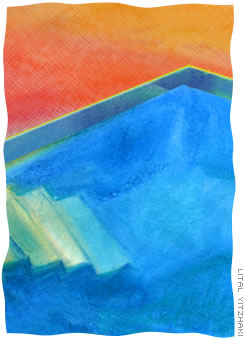October 21, 2010 by Liz Lawler
One Step Forward, Two Steps Back: A Two-Act Conversion Story
So where did we leave off? Was I up to my waist in the mikvah? Yes. But let me back-track to the conversion process itself.

I chose the “easy” way in, so to speak. Faced with the multiple schools of Judaism, I panicked and went with the one that seemed the least dogmatic. I chose a Reform rabbi to initiate me. But while it was non-threatening in many ways, it also left me with the anguish of choice and agency. It gave me the responsibility of co-creating my own sense of Jewishness. My rabbi never claimed to have any definitive answers, refused to impose too many rules. There was a decent amount of structure: I got the usual crash course in Jewish literacy, took a class called Judaism 101. And, at the rabbi’s insistence, this started out as a joint-process. My then fiancé had to attend the classes, and private sessions with the rabbi. We also went to services semi-faithfully. Ostensibly, this was so that we would be on the same religious page, as a family. But really, I felt like it was only fair, that he should have to sit through these interminable services with me. He could barely disguise his boredom. As for me, it was overwhelming, all of this Hebrew, the up and down, the repetition and the singing. So there we were: side by side, both of us terribly awkward about the whole thing, but for different reasons.
When you do this sort of thing as a couple, it brings up a lot of “stuff” for both of you, as individuals. It brought me up against my sense of self and autonomy, my core beliefs. The things that it brought up for him are his to tell. But suffice to say, it was clearly not easy. The process also exposes the fissures in your relationship, underscores the cross-cultural tension that just plainly exists in any inter-racial/religious/national couple out there. There are reasons that “birds of a feather…” etc. On the face of it, it is just easier to stick with your own. As far as I am concerned, the emphasis on marrying Jewish has less to do with preserving a tribal identity, and more to do with keeping divorce rates and murder-suicides in check. By the mid-way point, we were both fairly disillusioned with the whole thing. I found myself less engaged by the religion that I might have hoped, like it was there to entertain me somehow, like I was entitled to feel let-down. And he figured out that this conversion wasn’t magically going to re-write my personal history and ethnic identity in Jewish terms. Whatever we both set out to make of this was not meant to be. After a particularly bad fight, I put the whole thing on hold. Our rabbi could not have been more gracious and kind about it. And during the hiatus, he happened to retire. So, when I wanted to pick things up a year later, I had to turn elsewhere. I ended up with a Conservative Rabbi, this time a woman, and a woman who was perfectly fine leaving my (now) husband out of the whole thing. We were both relieved. I started this journey for love, and love is really the only thing that kept me in it: the world and your own expectations will conspire to drive you off-course.
I made it through. And more importantly, we made it through. I bobbed out of that mikvah like a giant pregnant apple. Freshly Jewish. My husband cleared out Russ and Daughters in an effort to help solidify the thing: a feast of lox and bagels awaited me at home. It was tongue in cheek, a gentle self-mockery: of course Jews celebrate through food. But it was the sweetest welcome home I’ve gotten. Walking into our Jewish home, and curling up on the sofa as just us: a tiny Jewish family, a united front against the world.
–Liz Lawler
 Please wait...
Please wait...
Pingback: Practice Makes Jewish |